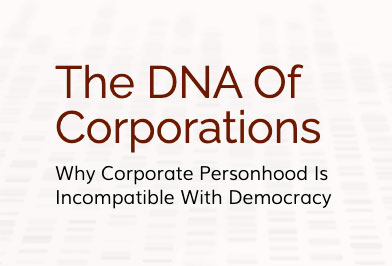Not hearing a clamor these days for banning cigarettes. We had a learning experience during our flirtation with alcohol prohibition. After a many decade campaign by the Women’s Christian Temperance Union and other determined organizations, the 18th amendment of 1919 banned alcohol sales in the USA. Bad things happened, and it was quickly repealed by the 21st amendment in 1933.
We might expect a tobacco ban to net similar results: black markets, organized crime, products of suspicious provenance, overworked and underfunded police. So although everyone, smokers included, agree smoking is a bad habit, they might also agree that banning cigarettes would be a mistake.
But what about tobacco advertising? The general assumption in the world of commerce is that a product legal to sell is also automatically legal to advertise. Taken for granted.
But during these last days of corporate personhood, we might reconsider that principle. When corporations no longer have constitutionally protected freedom of speech, why would we continue to put up with tobacco advertising?
Early state constitutions required corporations to operate for the good of the community. State legislatures were empowered to hold them accountable, even to the extent of revoking charters, i.e. dissolving the company and putting it out of business. They were dead serious about corporate misbehavior.
So although not allowing a company to advertise seems extreme, it may not be in light of this principle. Banning cigarettes would not be for the good of the community, but banning their advertising would be.
Tobacco advertising, despite company denials and the demise of Joe Camel, is directed at children. This is because few people over the age of 20 are dumb enough to start smoking. Every adult knows that smoking causes cancer and other unfortunate respiratory ailments. For example, ask someone with emphysema to describe their experience. You will be horrified.
Non-smoking adults rarely start. To maintain their business, cigarette companies must recruit new smokers, and only the young are available. Parents and teachers preach to teenagers the dangers of smoking. But, big surprise, teens don’t always believe what adults tell them.
Once we have eliminated corporate personhood and control over corporate behavior is re-established, advertising, sponsorship, merchandise, and all other public promotion of cigarettes will be eliminated. While we are at it, we will also mandate so-called plain packaging.
If this freaks you out, please note: we have not prohibited their sale. We have placed no constraints on the freedom of individuals. You can buy cigarettes and you can smoke them in any appropriate venue. Four packs a day? It’s up to you. But you will have to supply your own motivation. Smoke or not, it’s your choice. But there will be no advertising messages attempting to talk you into it. A big win for public health.
Once we have de-normalized and eliminated tobacco advertising, what’s next? Are there other legal products whose advertising should be constrained? You might provide your own speculation.
Every vendor wants to maximize sales. For most items, there is a right amount, and then there is excess. For the company, however, there is no such thing as too much. Alcohol is an obvious example. Many engage in social drinking without consequence. We try to limit our own consumption, and take an Uber home if we’ve had too much.
You might be a responsible drinker, but many are not. A quick search reveals how many have lost their lives to alcohol. We are talking alcoholism, and we are talking traffic accidents. Nevertheless, sellers use every opportunity to convince us to consume more. Alcohol advertising definitely needs a second look.
Examples multiply. As of 2022 the obesity rate in the USA is 36.2% A few very small countries have higher rates, but among large nations, we are the fattest. We are not fat-shaming anybody, just reciting the statistics. Despite this, wherever we go, we are encouraged to chow down on double-bacon cheeseburgers or similar fare. Why is this a good idea? Even George H.W. Bush, may he rest in peace, would agree that if we replaced burger ads with broccoli we would be a healthier country.
It is not in the public interest to allow large corporations unlimited access to our common space. To say freedom of speech means its ok to use limitless corporate cash to convince people to do things that are bad for them is a perversion of the principle. Once corporate personhood has been eliminated, we will take back our space and manage it carefully.
And Speaking of Common Space . . .
Although Common Space as discussed here can be anywhere advertising reaches us, wherever we happen to be, the more traditional definition of Common Space is “outside.” Whenever you are outside, beyond your own yard, at least, you are in common space.
Walking down the sidewalk, driving, feeding the birds, hiking or biking. In common space, you are free to roam.
America is fortunate enough to have neither cities ruined by conflict, nor countrysides contaminated with land mines. We have built an amazing place through the efforts of generations of Americans over centuries. What does this landscape, this common space that belongs to the community, look like after these back-breaking efforts by millions of hard-working people? Well, here is what it should look like: beautiful, safe, clean, quiet, and well-maintained.
If you go outside, and you experience anything short of that, then you have been cheated. You and your forefathers have worked for it, and you shouldn’t settle for less.
If you live in a wealthy enclave, or in one of America’s picturesque small towns, then you may experience something close to this ideal. Unfortunately the resources that might have gone to maintain this beautiful place have instead migrated to the hands of a few very rich individuals, through the mechanism of the Corporate State. Thus for most of us, the environment is ugly, dangerous, dirty, noisy, and neglected. Americans deserve better, and they should demand it. How? Go to movetoamend.org
Topic:
Corporations